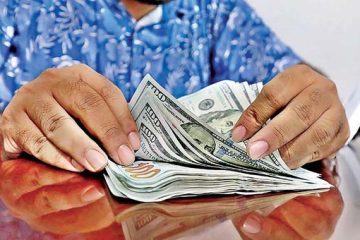Standard and Poor’s on Friday downgraded its rating of Russia’s ability to repay debt as alarm grew over the effects of the Ukraine crisis on the economy amid increased capital flight and slumping growth. Russia’s central bank also hiked interest rates by half a percentage point in a move aimed at curbing inflation which could also help limit capital flight and pressures on the ruble.Russia saw capital outflows in the first quarter of 2014 double from the level a year earlier to $50.6 billion (37 billion euros) over the uncertainty created by the Ukraine crisis and fears of greater sanctions.
Standard and Poor’s cited concerns over capital flight as the main reason for cutting Russia’s rating a notch to BBB- with a negative outlook.
‘In our view, the large capital outflows from Russia in the first quarter of 2014 heighten the risk of a marked deterioration in external financing,’ the ratings agency said in a statement.
‘In our view, the tense geopolitical situation between Russia and Ukraine could see additional significant outflows of both foreign and domestic capital from the Russian economy,’ it said.
It warned that it could downgrade Russia’s rating further if Western powers opt to impose sanctions that are tougher on its economy.
‘We could also lower our ratings on Russia if tighter sanctions were to result in additional weakening of Russia’s net external position,’ it said.
The government estimates that capital outflows could reach between $70 billion to $100 billion for the full year.
Capital outflows are estimated by economists and officials to have surged to $60-70 billion for the first quarter, more than for all of 2013 combined, as investors took fright at the uncertainty.
Russia’s new credit rating of BBB- is considered the lowest investment grade, making it one step above junk status, according to Standard & Poor’s.
Standard and Poor’s had already in March downgraded the outlook on Russia’s credit rating from stable to negative following its annexation of Crimea.
In the next few years, Russia is not expected to take effective steps to improve its economy through structural reforms, Standard & Poor’s said.
Russia has already brushed off expressions of concern from international ratings agencies, with first deputy prime minister Igor Shuvalov saying Moscow needs to think of making its own homegrown ratings agencies.
Russia’s Economic Development minister Alexei Ulyukayev said the subsequent lowering of the rating was only to be expected, while suggesting it was politically motivated.
‘It’s an expected decision, because first the outlook was revised, then the ratings are revised,’ Ulyukayev said, quoted by the Interfax news agency.
‘It’s clear that it is partly a politically motivated decision, and possibly it is partly a reaction to the real worsening of the macroeconomic situation in which we find ourselves,’ the minister said.
Russia could tip into recession in the second quarter of 2014 after the economy contracted by around 0.5 per cent in the first three months of the year.
The International Monetary Fund this month slashed its forecast for Russia’s 2014 growth by two-thirds to 1.3 per cent due to the political uncertainty.
With Russia also fighting inflation as well as slumping growth, Russia’s central bank said on Friday it had raised its key interest rate to 7.5 per cent from 7.0 per cent.
The Bank Rossii ‘took the decision to raise the key interest rate up to 7.5 per cent due to the growing inflationary risks,’ it said in a statement.
Russia had raised its key interest rate from 5.50 per cent to 7.0 per cent on March 2 in a move which helped take pressure off the ruble.
The bank said the risk of inflation climbing above 5.0 per cent by the end of 2014 had ‘risen significantly.’
The bank did not refer specifically to Ukraine, but referred to ‘the uncertainty of the international political situation,’ which it said was ‘having a negative effect on the dynamic of production and investments.’
-With New Age input




















